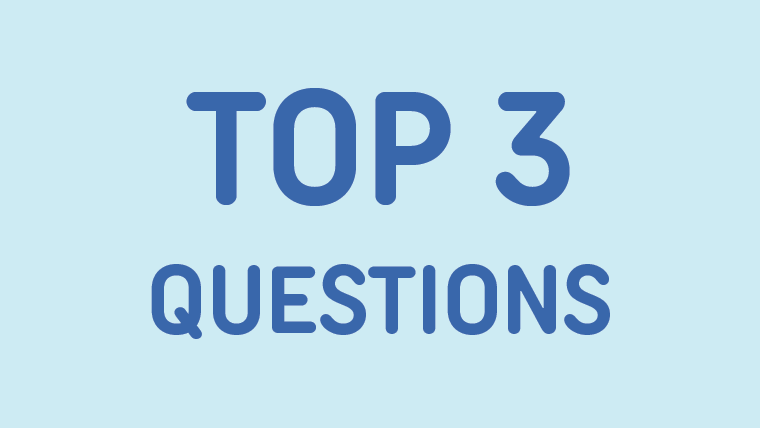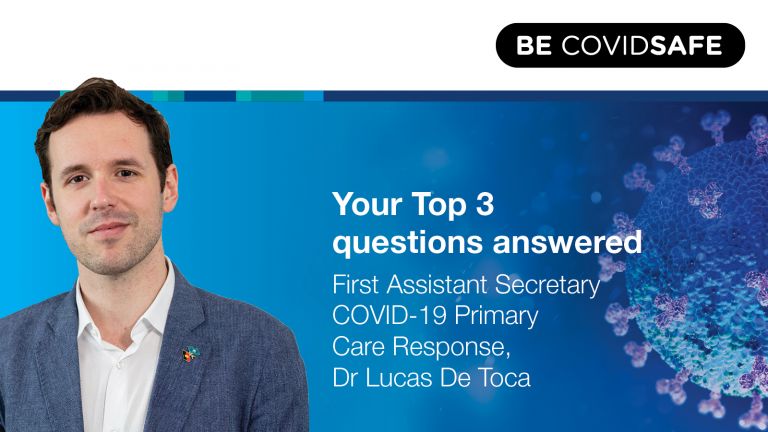
Good afternoon. I am Lucas de Toca and I lead the rollout of the vaccine through GPs, pharmacies and Aboriginal health services for the Australian Government. Today we will be answering your most asked questions in our social media channels and hopefully sharing some useful information about COVID-19 and the vaccines. As usual, I’m joined by Linda who is interpreting in Auslan for all of you. Thank you, Linda. We are in the land Ngunnawal people, so Dhawra nhuna, dhawra Ngunawal. Yanggu gulanyin ngalawiri, dhunayi, Ngunawal dhawra. Wanggarralijinyin mariny balan bugarabang. And I also extend the acknowledgement to the traditional owners of the lands where you may be watching from. Thank you for joining us today. A very strong shout out today goes for Breast Cancer Awareness Week. If you have your appointment for a mammogram and you have it already booked in, please do not cancel it. It is really important that, as we continue with the pandemic, medical issues, medical appointments, screening, checks don’t take a back seat. If you are due for your mammogram and you don’t have an appointment yet, please go out and get one. It is really important that we remain aware, we remain screened and health checked, and it is hard not to think that everything COVID at the moment, but other health issues are still important.
Today we are going to talk about people 60 years and over getting the vaccine. We are going to talk about some of the misinformation about the vaccine and infertility or risks during pregnancy, and we are also going to talk about how to protect kids from COVID and whether kids can get COVID.
In terms of the first question, we often get asked why is it that now, people 60 years and over, can get mRNA vaccines or any COVID-19 vaccine in Australia?
The exciting reality is at the moment if you are 60 years and over, you can get vaccine of the three that we have in Australia, either the AstraZeneca vaccine (Vaxzevria), the Pfizer vaccine (Comirnaty) and the Moderna vaccine (Spikevax). People 12 years and over can get either Moderna or Pfizer, because those vaccines are approved for anyone 12 years and over. They are very similar, very similar technology. MRNA vaccines are incredibly effective and anyone 12 years and over can now get it, whether you are 12, 15 or 50 or 70. For people 18 years and over, the AstraZeneca vaccine is also available, so it is not available for people 12 to 17, and it is preferentially recommended for people 60 and over. The reality is we have thousands upon thousands of points of presence around the country. There are clinics, pharmacies, state clinics, Commonwealth vaccination clinics, all around the country. About 10,000 all up, where you can just go and get your vaccine. There are plenty of appointments available. If you go to health.gov.au you can find the Vaccine Clinic Finder and you will see that in most cases, nowadays you can get an appointment if not on the same day, you can get it within the same week. More and more appointments are becoming available every day, check if you don’t see one around you. We have simplified things a lot, there are no many questions on the eligibility checker now, everyone 12 and over are eligible, so if you remain unvaccinated, and fewer and fewer people are unvaccinated because we have incredible numbers coming through, please go make your appointment today and get your vaccine. It has never been easier to receive a vaccine in Australia than it is now. They are free and they are for everyone.
The second question that we have today is about infertility as a side effect from either of the COVID vaccines. I have to say, that is just not true. It is not something we have observed, there is no evidence to suggest that any vaccine, let alone the COVID-19 vaccines, have a side effect of infertility. Of course, it is something is coming up in social media every now and then, and that we are worried about this because it is something we don’t want to have, so it is important we talk about it and clarify the truth, and the untruth, around these things. The rumour, or the misinformation, says that the spike protein, which is the viral protein that is produced by the vaccines in your body that help your body then recognise the virus, is the same as a protein called Syncytin-1 that helps the placenta develop. The theory says that because those proteins are the same, your body learns to attack it and will cause issues with pregnancy or fertility. That is simply not true. The spike protein in the virus that the vaccine produces to help you recognise the virus, and the Syncytin-1 protein that is involved in placental development are not the same protein. There is no evidence whatsoever that any of the antibodies that are produced to help your body fight the infection as a result of the vaccine, have any impact on placental development on that protein or in your capacity to get pregnant or be fertile. There is also no evidence that people who are seeking to get pregnant or at the later stages of pregnancy, have any safety concerns from the vaccines themselves. In fact, we know that pregnant women are at much higher risk of severe outcomes, severe disease and being hospitalised from COVID-19, and that is why the Australian Technical Advisory Group on Immunisation and the Australasian College of Obstetricians and Gynaecologists, strongly encourage pregnant women and women who are planning to get pregnant, to get a COVID-19 vaccine at any stage of the pregnancy. They are safe and there is no link to infertility, so let’s put that rumour to rest.
The final issue that we are discussing today is whether younger kids can get COVID, and I think we all know now, especially with the high numbers of infection that we have seen with the Delta variant of the virus, that kids can get COVID and COVID can be transmitted in children. Luckily, and that is a really good thing, the disease is milder and the kids, especially younger kids, have a higher chance of being asymptomatic, not displaying symptoms, and when they get symptoms, have a higher chance of having a mild course of the infection. It does not mean kids cannot get severe disease or bad outcomes from COVID, but they are far less likely of that than adults. That is why we are seeing, and it is incredibly pleasing to see, that in the last four weeks since adolescents 12 to 15 years of age have become broadly eligible to receive a COVID-19 vaccine, pretty much half of all people in that age group have already received one dose. It is remarkable how very young people, and of course families and parents, are coming forward to get vaccinated. Half of the population in less than four weeks have already received one dose of the vaccine, which is great. At the moment, there are no vaccines approved for children younger than 12, so the best thing that we can do to protect children who are yet able to be vaccinated, is to be vaccinated ourselves around the kids and continue to practice COVIDSafe behaviours that will minimise the risk of transmission onto the household and the risk of then transmission to children. We will continue to monitor the evidence, the new studies and the Therapeutic Goods Administration will keep reviewing what we are seeing overseas and domestically, and it is likely that in the future, younger groups will be able to get the vaccine. In the meantime, the best thing we can do is ensure that everyone 12 years and over who is eligible to get the vaccine, gets it as quickly as possible so we are protected as a society.
Thank you so much for watching and thank you for submitting your questions and thank you for staying COVID safe. We will see you next time.
Top 3 questions
- Why is it okay for people who are 60 years and over to receive any of the available COVID-19 vaccines in Australia?
- Can the COVID-19 vaccines affect fertility and are they safe for people planning a pregnancy in the future?
- Can children spread COVID-19 to other children and adults?









